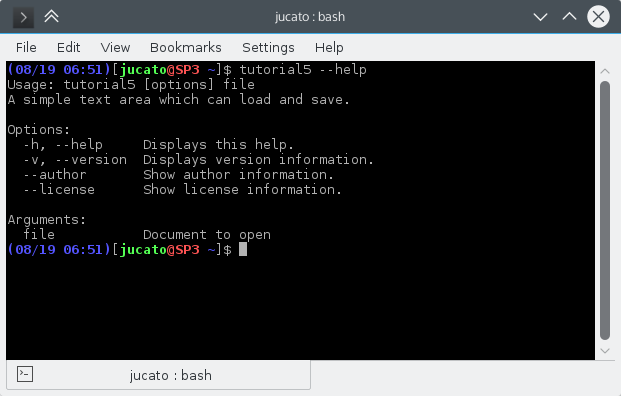Development/Tutorials/CommandLineArguments/pt-br
| Tutorial Series | Tutorial para Iniciantes |
| Previous | Tutorial 4 - Loading and saving |
| What's Next | n/a |
| Further Reading | n/a |
Resumo
Agora que temos um editor de texto que pode abrir e salvar arquivos. Agora, faremos com que o editor aja mais como um aplicativo de desktop, permitindo que ele abra arquivos a partir de argumentos de linha de comando ou mesmo usando Abrir com no Dolphin.

O Código
main.cpp
#include <cstdlib>
#include <QApplication>
#include <QCommandLineParser>
#include <QUrl>
#include <QDir>
#include <KAboutData>
#include <KLocalizedString>
#include "mainwindow.h"
int main (int argc, char *argv[])
{
QApplication app(argc, argv);
KLocalizedString::setApplicationDomain("tutorial5");
KAboutData aboutData(
// The program name used internally. (componentName)
QStringLiteral("tutorial5"),
// A displayable program name string. (displayName)
i18n("Tutorial 5"),
// The program version string. (version)
QStringLiteral("1.0"),
// Short description of what the app does. (shortDescription)
i18n("A simple text area which can load and save."),
// The license this code is released under
KAboutLicense::GPL,
// Copyright Statement (copyrightStatement = QString())
i18n("(c) 2015"),
// Optional text shown in the About box.
// Can contain any information desired. (otherText)
i18n("Some text..."),
// The program homepage string. (homePageAddress = QString())
QStringLiteral("http://example.com/"),
// The bug report email address
// (bugsEmailAddress = QLatin1String("[email protected]")
QStringLiteral("[email protected]"));
aboutData.addAuthor(i18n("Name"), i18n("Task"), QStringLiteral("[email protected]"),
QStringLiteral("http://your.website.com"), QStringLiteral("OSC Username"));
KAboutData::setApplicationData(aboutData);
QCommandLineParser parser;
aboutData.setupCommandLine(&parser);
parser.addPositionalArgument(QStringLiteral("file"), i18n("Document to open"));
parser.process(app);
aboutData.processCommandLine(&parser);
MainWindow* window = new MainWindow();
window->show();
if (parser.positionalArguments().count() > 0)
{
window->openFile(QUrl::fromUserInput(parser.positionalArguments().at(0), QDir::currentPath()));
}
return app.exec();
}mainwindow.h
#ifndef MAINWINDOW_H
#define MAINWINDOW_H
#include <KXmlGuiWindow>
class KTextEdit;
class KJob;
class MainWindow : public KXmlGuiWindow
{
Q_OBJECT
public:
explicit MainWindow(QWidget *parent = nullptr);
void openFile(const QUrl &inputFileName);
private:
void setupActions();
private slots:
void newFile();
void openFile();
void saveFile();
void saveFileAs();
void saveFileAs(const QString &outputFileName);
void downloadFinished(KJob* job);
private:
KTextEdit* textArea;
QString fileName;
};
#endifmainwindow.cpp
#include <QApplication>
#include <QAction>
#include <QSaveFile>
#include <QFileDialog>
#include <QTextStream>
#include <QByteArray>
#include <KTextEdit>
#include <KLocalizedString>
#include <KActionCollection>
#include <KStandardAction>
#include <KMessageBox>
#include <KIO/Job>
#include "mainwindow.h"
MainWindow::MainWindow(QWidget *parent) : KXmlGuiWindow(parent), fileName(QString())
{
textArea = new KTextEdit();
setCentralWidget(textArea);
setupActions();
}
void MainWindow::setupActions()
{
QAction* clearAction = new QAction(this);
clearAction->setText(i18n("&Clear"));
clearAction->setIcon(QIcon::fromTheme("document-new"));
actionCollection()->setDefaultShortcut(clearAction, Qt::CTRL + Qt::Key_W);
actionCollection()->addAction("clear", clearAction);
connect(clearAction, SIGNAL(triggered(bool)), textArea, SLOT(clear()));
KStandardAction::quit(qApp, SLOT(quit()), actionCollection());
KStandardAction::open(this, SLOT(openFile()), actionCollection());
KStandardAction::save(this, SLOT(saveFile()), actionCollection());
KStandardAction::saveAs(this, SLOT(saveFileAs()), actionCollection());
KStandardAction::openNew(this, SLOT(newFile()), actionCollection());
setupGUI(Default, "tutorial5ui.rc");
}
void MainWindow::newFile()
{
fileName.clear();
textArea->clear();
}
void MainWindow::saveFileAs(const QString &outputFileName)
{
if (!outputFileName.isNull())
{
QSaveFile file(outputFileName);
file.open(QIODevice::WriteOnly);
QByteArray outputByteArray;
outputByteArray.append(textArea->toPlainText().toUtf8());
file.write(outputByteArray);
file.commit();
fileName = outputFileName;
}
}
void MainWindow::saveFileAs()
{
saveFileAs(QFileDialog::getSaveFileName(this, i18n("Save File As")));
}
void MainWindow::saveFile()
{
if (!fileName.isEmpty())
{
saveFileAs(fileName);
}
else
{
saveFileAs();
}
}
void MainWindow::openFile()
{
openFile(QFileDialog::getOpenFileUrl(this, i18n("Open File")));
}
void MainWindow::openFile(const QUrl &inputFileName)
{
if (!inputFileName.isEmpty())
{
KIO::Job* job = KIO::storedGet(inputFileName);
fileName = inputFileName.toLocalFile();
connect(job, SIGNAL(result(KJob*)), this, SLOT(downloadFinished(KJob*)));
job->exec();
}
}
void MainWindow::downloadFinished(KJob* job)
{
if (job->error())
{
KMessageBox::error(this, job->errorString());
fileName.clear();
return;
}
KIO::StoredTransferJob* storedJob = (KIO::StoredTransferJob*)job;
textArea->setPlainText(QTextStream(storedJob->data(), QIODevice::ReadOnly).readAll());
}tutorial5ui.rc
<?xml version="1.0" encoding="UTF-8"?>
<gui name="tutorial5"
version="1"
xmlns="http://www.kde.org/standards/kxmlgui/1.0"
xmlns:xsi="http://www.w3.org/2001/XMLSchema-instance"
xsi:schemaLocation="http://www.kde.org/standards/kxmlgui/1.0
http://www.kde.org/standards/kxmlgui/1.0/kxmlgui.xsd" >
<MenuBar>
<Menu name="file" >
<Action name="clear" />
</Menu>
</MenuBar>
<ToolBar name="mainToolBar" >
<text>Main Toolbar</text>
<Action name="clear" />
</ToolBar>
</gui>
Explicação
mainwindow.h
Aqui não fizemos nada além de adicionar uma nova função openFile que utiliza uma QUrl. Novamente, usamos uma QUrl em vez de uma QString para que também possamos trabalhar com arquivos remotos como se fossem locais.
void openFile(const QUrl &inputFileName);mainwindow.cpp
Não há código novo aqui, apenas reorganizando. Tudo de void openFile() foi movido para void openFile(const QUrl & inputFileName), exceto a chamada para QFileDialog::getOpenFileUrl().
Dessa forma, podemos chamar openFile() se quisermos exibir uma caixa de diálogo, ou podemos chamar openFile(QUrl) se já sabemos o nome do arquivo. Que será o caso de quando alimentarmos o nome do arquivo através da linha de comando.
main.cpp
This is where all the QCommandLineParser magic happens. In previous examples, we only used the class to feed QApplication the necessary data for using flags like --version or --author. Now we actually get to use it to process command line arguments.
First, we tell QCommandLineParser that we want to add a new positional arguments. In a nutshell, these are arguments that are not options. -h or --version are options, file is an argument.
parser.addPositionalArgument(QStringLiteral("file"), i18n("Document to open"));Later on, we start processing positional arguments, but only if there is one. Otherwise, we proceed as usual. In our case we can only open one file at a time, so only the first file is of interest to us. We call the openFile() function and feed it the URL of the file we want to open, whether it is a local file like $HOME/foo or a remote one like ftp.mydomain.com/bar. We use the overloaded form of QUrl::fromUserInput() in order to set the current path. This is needed in order to work with relative paths like "../baz".
if (parser.positionalArguments().count() > 0)
{
window->openFile(QUrl::fromUserInput(parser.positionalArguments().at(0), QDir::currentPath()));
}Make, Install and Run
CMakeLists.txt
cmake_minimum_required(VERSION 3.0)
project (tutorial5)
set(QT_MIN_VERSION "5.3.0")
set(KF5_MIN_VERSION "5.2.0")
find_package(ECM 1.0.0 REQUIRED NO_MODULE)
set(CMAKE_MODULE_PATH ${ECM_MODULE_PATH} ${ECM_KDE_MODULE_DIR} ${CMAKE_CURRENT_SOURCE_DIR}/cmake)
include(KDEInstallDirs)
include(KDECMakeSettings)
include(KDECompilerSettings NO_POLICY_SCOPE)
include(FeatureSummary)
find_package(Qt5 ${QT_MIN_VERSION} CONFIG REQUIRED COMPONENTS
Core # QCommandLineParser, QStringLiteral, QSaveFile, QTextStream, QByteArray
Widgets # QApplication, QAction, QFileDialog
)
find_package(KF5 ${KF5_MIN_VERSION} REQUIRED COMPONENTS
CoreAddons # KAboutData
I18n # KLocalizedString
XmlGui # KXmlGuiWindow, KActionCollection
TextWidgets # KTextEdit
ConfigWidgets # KStandardActions
WidgetsAddons # KMessageBox
KIO # KIO
)
feature_summary(WHAT ALL INCLUDE_QUIET_PACKAGES FATAL_ON_MISSING_REQUIRED_PACKAGES)
set(tutorial5_SRCS main.cpp mainwindow.cpp)
add_executable(tutorial5 ${tutorial5_SRCS})
target_link_libraries(tutorial5
Qt5::Widgets
KF5::CoreAddons
KF5::I18n
KF5::XmlGui
KF5::TextWidgets
KF5::ConfigWidgets
KF5::WidgetsAddons
KF5::KIOCore
)
install(TARGETS tutorial5 ${KDE_INSTALL_TARGETS_DEFAULT_ARGS})
install(FILES tutorial5ui.rc DESTINATION ${KDE_INSTALL_KXMLGUI5DIR}/tutorial5)
With this file, the tutorial can built and run in the same way as tutorial 3 and 4. For more information, see tutorial 3.
mkdir build && cd build
cmake .. -DCMAKE_INSTALL_PREFIX=$HOME
make install
XDG_DATA_DIRS=$HOME/share:$XDG_DATA_DIRS $HOME/bin/tutorial5
